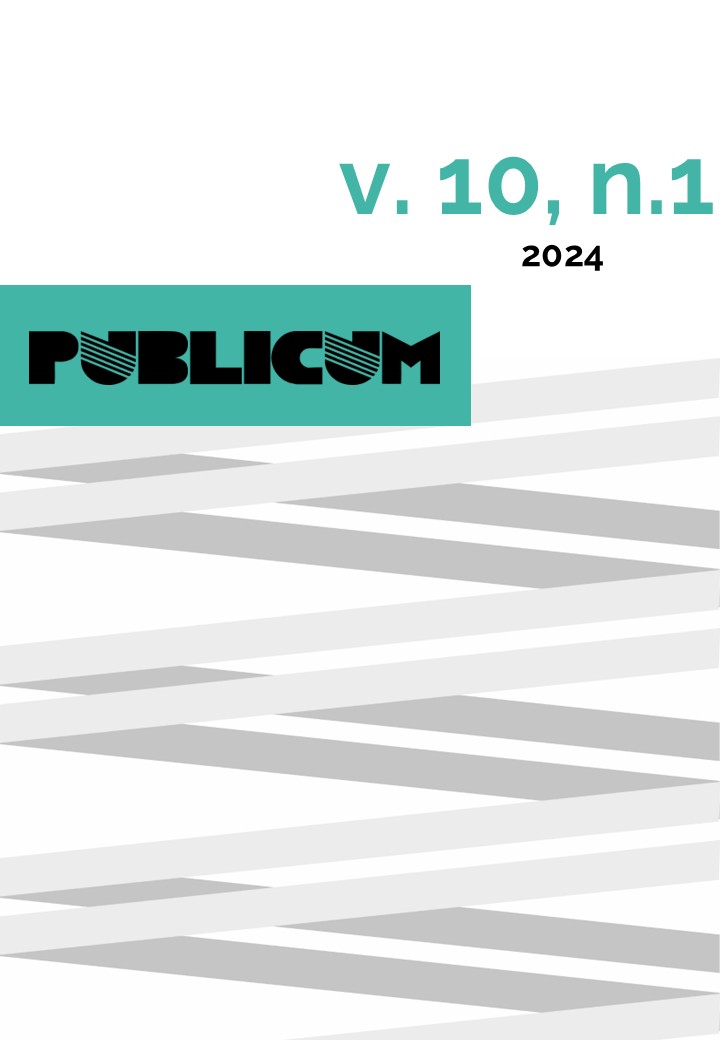Acessibilidade e Cidadania Digital
O papel da IA na ampliação do acesso à Justiça, considerando as implicações para a cidadania digital
DOI:
https://doi.org/10.12957/publicum.2024.80249Palabras clave:
Acesso à justiça, inteligência artificial, arquitetura transformerResumen
El artículo examina la relación entre la accesibilidad de la justicia y la adopción de tecnologías innovadoras, enfatizando la importancia de la Ley Federal Nº 11.419/2009 en el proceso de digitalización del proceso civil brasileño. Aborda los avances y desafíos enfrentados en la sustitución del proceso físico por el digital, destacando que la transición todavía requiere mejoras continuas. La Resolución Nº 332/2020 del CNJ se presenta como un mecanismo de equilibrio entre el uso de la inteligencia artificial y el mantenimiento de la transparencia y seguridad en el Poder Judicial, esenciales para la confianza en el sistema. El artículo también discute la necesidad de comprensión y entrenamiento para el uso eficiente de nuevos modelos tecnológicos y la importancia de la regulación y colaboración interinstitucional para la integración de estas innovaciones. Se concluye que, para alcanzar un Poder Judicial más accesible y eficiente, es necesaria una acción proactiva para adaptarse a las exigencias contemporáneas de justicia y ciudadanía, donde la tecnología juega un papel crucial.
Citas
CAPPELLETTI, Mauro e GARTH, Bryant. Acesso à Justiça. Tradução Ellen Gracie Northfleet. Porto Alegre: Sérgio Antonio Fabris Editor, 2002.
CHATFIELD, Tom. Como viver na era digital. Tradução de Bruno Fiuza. Rio de Janeiro: Objetiva, 2012. Edição Kindle.
CONSELHO NACIONAL DE JUSTIÇA (CNJ). Justiça em Números 2023. Brasília: CNJ, 2023. Disponível em: https://www.cnj.jus.br/wp-content/uploads/2023/09/justica-em-numeros-2023-010923.pdf. Acesso em: 02 nov. 2023.
CONSELHO NACIONAL DE JUSTIÇA (CNJ). Resultados parciais do censo do Poder Judiciário 2023: relatório. Conselho Nacional de Justiça. Brasília: CNJ, 2023. Disponível em https://www.cnj.jus.br/wp-content/uploads/2023/09/relatorio-do-censo-de-2023.pdf. Acesso em: 04 nov. 2023.
ELLUL, Jacques. Le Bluff Technologique. Paris: Hachette, 1988.
KUMAR, L. Ashok e RENUKA, D. Karthika. Deep Learning Approach for Natural Language Processing, Speech, and Computer Vision Techniques and Use Cases. Boca Raton: CRC Press, 2023.
MESSER, Karl. Künstliche intelligenz – bewusstsein am scheideweg? neue humanoide Technologien unserer Zeit. Publicação independente, 2020.
PAAß, Gerhard e GIESSELBACH, Sven. Foundation Models for Natural Language Processing Pre-trained Language Models Integrating Media. Cham: Springer, 2023.
SINTONIA COM A SOCIEDADE. O que pensam os brasileiros sobre inteligência artificial? Como os avanços da IA afetam o nosso comportamento. Globo, 2023. Disponível em: https://gente.globo.com/infografico-o-que-pensam-os-brasileiros-sobre-inteligencia-artificial/. Acesso em: 04 nov. 2023.
SOUSA, Roberto Rodrigues de. O impacto da implantação do Processo Judicial Eletrônico nas Unidades Judiciais Cíveis e de Família do Distrito Federal e o reflexo no ritmo da tramitação processual. Brasília: Tribunal de Justiça do Distrito Federal e dos Territórios, 2018. Disponível em https://www.tjdft.jus.br/institucional/imprensa/campanhas-e-produtos/artigos-discursos-e-entrevistas/artigos/2018/o-impacto-da-implantacao-do-processo-judicial-eletronico-nas-unidades-judiciais-civeis-e-de-familia-do-distrito-federal-e-o-reflexo-no-ritmo-da-tramitacao-processual-roberto-rodrigues-de-sousa. Acesso em: 02 nov. 2023.
STAATSSEKRETARIAT FÜR BILDUNG, FORSCHUNG UND INNOVATION SBFI. Eidgenössisches Departement für Wirtschaft, Bildung und Forschung WBF. Bericht der interdepartementalen Arbeitsgruppe «Künstliche Intelligenz» an den Bundesrat, Herausforderungen der künstlichen Intelligenz. 2019. Disponível em : https://www.kmu.admin.ch/dam/kmu/de/dokumente/FaktenundTrends/herausforderungen-der-kuenstlichen-intelligenz.pdf.download.pdf/bericht_idag_ki_d.pdf. Acesso em: 26 nov. 2024.
STRYKER, Cole e HOLDSWORTH, Jim. O que é processamento de linguagem natural (pln)?. 2024. Disponível em: https://www.ibm.com/br-pt/topics/natural-language-processing?utm_source=chatgpt.com. Acesso em: 24 nov. 2024.
TEIXEIRA, Tarcisio. Direito digital e processo eletrônico. 5. ed. São Paulo: Saraiva Educação, 2020.
Descargas
Publicado
Cómo citar
Número
Sección
Licencia
Derechos de autor 2025 Lúcio Grassi de Gouveia, Haroldo Carneiro Leão Sobrinho

Esta obra está bajo una licencia internacional Creative Commons Atribución-NoComercial 4.0.
O autor do trabalho declara conhecer e concordar com as regras a seguir:
1) Realizou o trabalho apresentado à revista, sendo inteiramente responsável pelas ideias e conceitos nele emitidos, que não correspondem, necessariamente, ao ponto de vista dos Editores de Publicum.
2) Obedeceu, na realização do trabalho, os princípios éticos aludidos na política de avaliação da revista[RDN1] .
3) Assume a autoria e a responsabilidade pela obra, declarando que ela não infringe quaisquer direitos de propriedade intelectual de terceiros.
4) Responsabiliza-se, integralmente, por danos de natureza moral ou patrimonial que a veiculação da obra venha a gerar a terceiros.
5) Cede à revista os direitos de reprodução, edição e primeira publicação do trabalho em qualquer meio midiático, em particular sob forma digital, em arquivo eletrônico online na internet.
6) Confere aos Editores o direito de modificar o texto apresentado, sem prejuízo de seu conteúdo, quando necessário para uniformizar a apresentação dos trabalhos e para atender as normas de edição próprias da revista.
7) Concorda com a forma final do trabalho aprovada pela revista.
8) Autoriza a divulgação do trabalho nos canais de comunicação da Faculdade de Direito da UERJ.
9) Concorda com a reprodução de pequenos trechos do trabalho em outras publicações da UERJ.
10) Reconhece que, pela cessão e autorizações acima referidas, não receberá remuneração sob qualquer modalidade, tendo estas o caráter de colaboração científica.
11) Tem ciência de que a publicação do trabalho poderá ser recusada caso não considerada conveniente, por qualquer motivo que seja, sendo que tal recusa não gera responsabilidade e/ou ônus de espécie alguma à revista ou UERJ.
[RDN1]Ver COPE.

Publicum está licenciado com uma Licença Creative Commons Atribuição-NãoComercial 4.0 Internacional.

